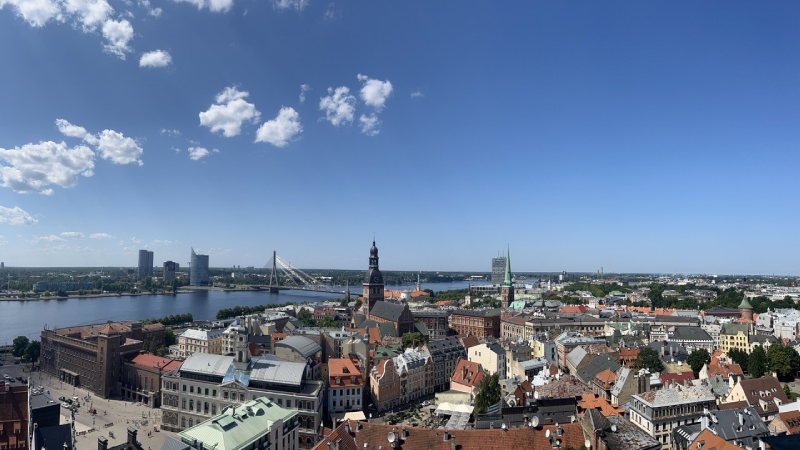U.S. Perspectives on Baltic Security
By Natasha Wood, MALD 2024 Candidate, The Fletcher School
My first exposure to Baltic security came in August 2022 when I traveled to Vilnius, Lithuania as an Atlantic Council congressional fellow. Our group in Vilnius included former U.S. Ambassador to Ukraine John Herbst, the Atlantic Council Eurasia team, and about ten congressional staffers, including myself. In meeting after meeting at the Lithuanian defense and foreign affairs ministries, we were told in no uncertain terms how critical increased U.S.-NATO cooperation was for Baltic Sea Region (BSR) security.
Thanks to support from the Fletcher Russia and Eurasia Program, I was back in the Baltic countries this summer–this time in Riga, Latvia–as an intern at the Baltic Security Foundation (BSF). BSF is a think tank that publishes security research and gathers policymakers to discuss Baltic security issues. During my internship, I co-wrote a literature review with my colleague Teague Broquard at The Bush School assessing U.S. perceptions of Baltic security before and after Russia’s second invasion of Ukraine. The most important and recurring themes in the literature are perceptions of Russian disinformation, NATO cohesion, and civilian-based resistance before and after February 2022.
Before Russia’s reinvasion of Ukraine, a major theme in U.S. literature on NATO and the BSR was the need for better regional NATO cooperation. NATO’s primary BSR headquarters are split between Latvia and Denmark. NATO BSR land forces are in the Netherlands, and U.S. NATO headquarters for the BSR are split between Virginia and Europe. Before February 2022, there was concern that this approach would prevent a swift and effective mobilization. Analysts also recommended that future NATO strategic concepts more overtly address the threat of a Russian attack in the BSR, and that more frequent and realistic NATO exercises be held.
Since February 2022, most U.S. scholarship on NATO in the BSR focuses less on strategic planning and more on the immediate threat that the Baltic states face. Research from John Gilliam and Ryan Van Wie indicates a gap in NATO eastern flank deterrence capacity, and recommends an increase in U.S. troop presence in Central Europe and the Baltic states. Despite increases in troop presence through the European Deterrence Initiative and Enhanced Forward Presence battlegroup deployments, among other efforts, Baltic leaders continue to call for additional deployment.

In my first week in Riga, a friend told me over lunch that Latvia had national plans in place for how every part of society would resist occupation in the case of a Russian invasion. I was fascinated by that. Literature published before the war highlights the importance of this total security approach, drawing occasionally from examples of Latvian, Lithuanian, and Estonian resistance to Soviet occupation. Since Russia’s reinvasion of Ukraine, U.S. scholarship on Baltic total security has also focused on debates around mandatory conscription, which was reinstituted in April 2023.
Finally, Russian disinformation continues to be a major security risk in the Baltic states. Before February 2022, Russia allegedly weaponized the pandemic to strengthen misinformation campaigns in the BSR and cut off critical infrastructure via cyberattacks. Since February 2022, there has been continued concern that Russian speakers living in Latvia, about 25% of the population, are the most likely targets for Kremlin disinformation. Though Latvia’s media regulator banned all Russian-based TV channels from airing in Latvia in June 2022, reporting suggests that some Latvian-based viewers still access them online or via satellite antennas.
Since Russia invaded Georgia in 2008, the Baltic states have been among the first countries to raise alarm bells about the threat Russia presented to European security. Now, Latvia, Lithuania, and Estonia lead the world in bilateral aid to Ukraine measured by GDP and continue to spend well above 2% of GDP on defense. For the duration of the war and beyond, security perspectives from the Baltic states will likely remain both important and prescient.

